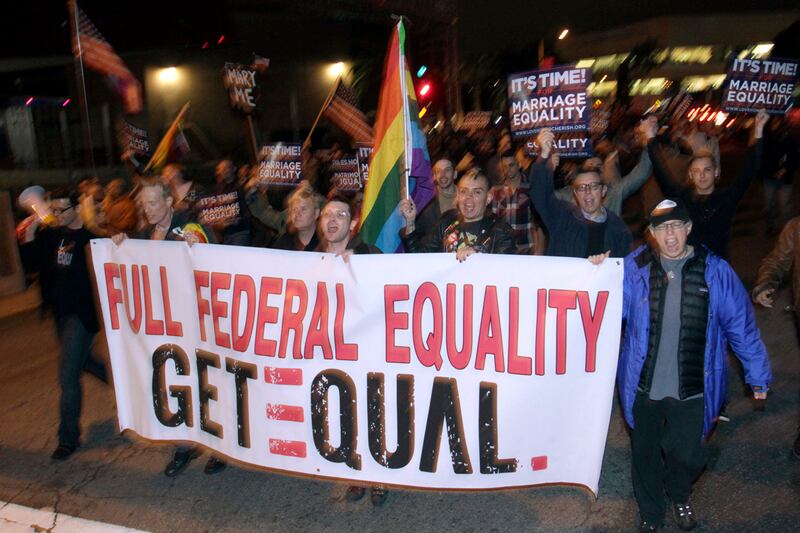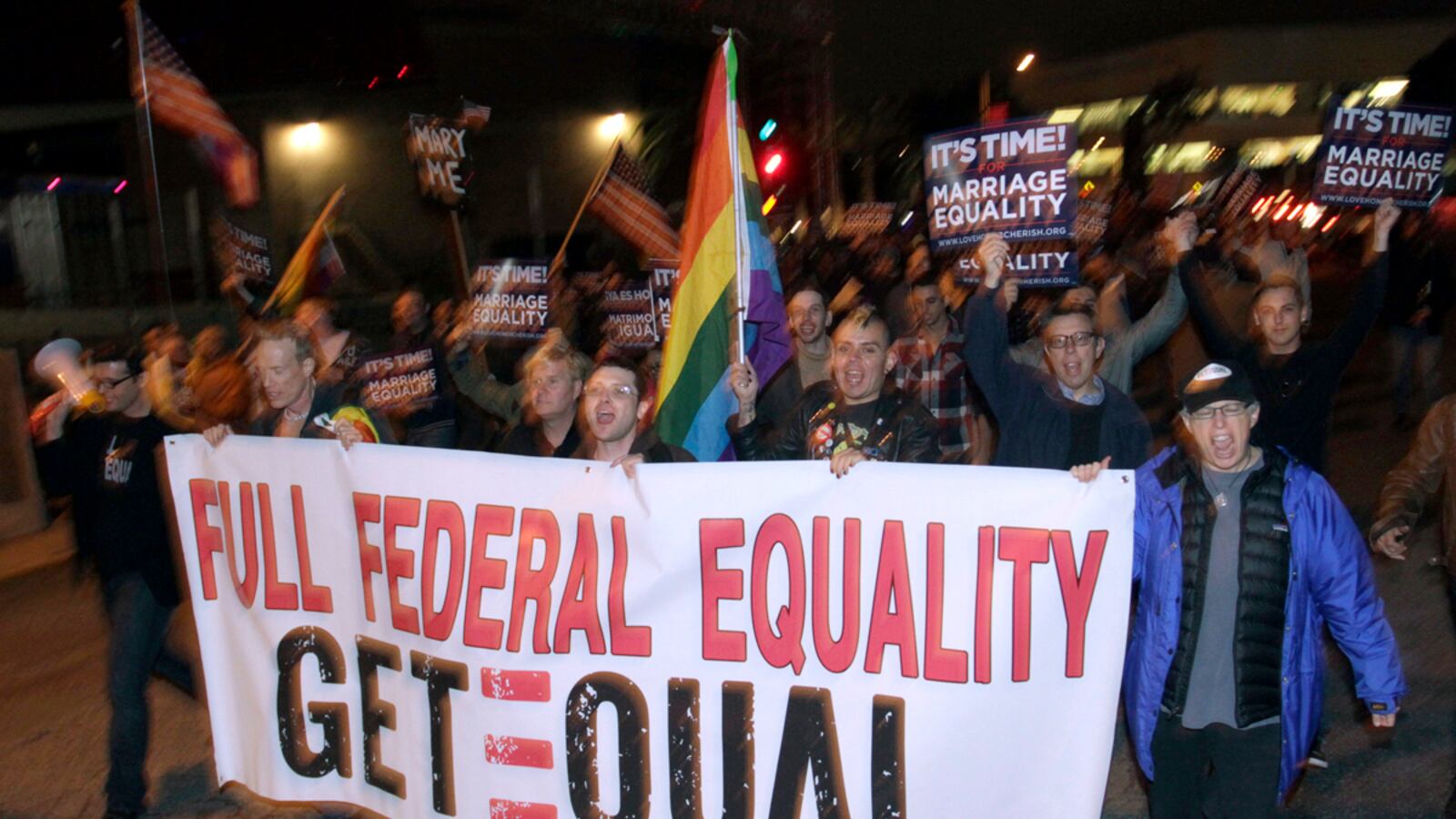The second judicial defeat of Proposition 8 in California this week was the latest in a cascade of bad news burying social conservatives. Just a few days prior, the Obama administration ruled, against the objections of conservative Catholics, that religious employers must pay for insurance that covers contraceptives. Before that decision could explode into a full-blown controversy, an anti-abortion executive at the breast-cancer foundation Susan G. Komen for the Cure tried to strong-arm Planned Parenthood, a move that backfired badly. The uproar left Komen’s leadership in disarray and Planned Parenthood looking more untouchable than ever, with a few extra millions in the bank.
The headlines of the past two weeks seem to reiterate a particular storyline about the culture wars, one progressives would desperately like to believe: that the trends are breaking their way, and the final defeat of the religious right comes nearer with each passing day. In the very long run, that narrative may not be far from the truth. But the drubbing social conservatives have been getting, particularly the seemingly unstoppable march of same-sex marriage, is only part of the story. Out of sight of the tweets, jokes, and image macros that often give wings to progressive causes online, the religious right has placed its bets on the banal dirty work of real-world electoral politics. And that long-term dedication to building a political infrastructure has placed it in a strong position on certain culture-war issues even as public opinion turns more sharply against it.
The Komen fiasco exemplified the cultural ground social conservatives have lost. The viral outrage the decision provoked showed how little America shares conservatives’ view of Planned Parenthood as a feral enemy of the traditional family. When Komen yanked its funding for the group’s breast-cancer screenings, the outrage was immediate and widespread: $3 million poured into Planned Parenthood’s vaults through online donations. A majority of Americans, including a majority of independent voters and Catholics, also say they support the administration’s new contraceptive requirement. The message is clear: Americans may be divided on abortion, but they generally support its legality and strongly dislike ideological interference with birth control. Opposition to birth control is not the primary agenda of the Christian right, but that Catholic obsession is a close cousin of the social-conservative view of sexuality, which it is safe to say many Americans do not share.

The landscape is similarly hostile on gay marriage. The percentage of Americans who support it has shifted dramatically over the past decade, soaring to 53 percent in 2011 from 35 percent in 1999, according to the Public Religion Research Institute. (The latest Pew Religion number is a slightly lower 46 percent.) California courts have delivered a devastating series of blows to Prop 8, seen by some as conservatives’ last stand against gay marriage. The cultural winds are blowing so hard in one direction that even the most red-meat social conservatives, including Michele Bachmann and Christine O’Donnell, do their damnedest to avoid addressing the issue in public. Figures as influential as the president of Focus on the Family have acknowledged they’ve lost the war.
But despite these unfavorable shifts in the cultural ground, social conservatives have proved to be tireless political organizers, willing to run for seemingly insignificant offices and fight every battle that comes their way at the local level. With a savvy blend of right-wing populism and religious social conservatism, they’ve made themselves relevant even as voters are focused primarily on the economy. By understanding the importance of every skirmish over sex education and public-school curricula, they’ve built a network of civic-minded warriors who at last have made their way to the center of national policy in Washington.
The 2010 midterm elections were an unprecedented victory for conservative politicians with little to no political experience but long resumes in radical social-conservative activism. They were elected on economic populism but immediately got to work pushing their social agenda, working to strip Planned Parenthood of federal funding every time the federal budget is under consideration. The 2011 legislative session was marked by one extreme bill after another, including one that attempted to hold women “responsible” for being raped so that they could be prohibited from getting an abortion.
Social conservatives have enjoyed an even more successful run in state politics. In 2010, they changed 19 state assemblies to Republican from Democrat. Nebraska passed a groundbreaking “fetal pain” bill that banned abortions after 20 weeks on the scientifically dubious grounds that fetuses can feel pain at that gestational stage. Five states—Kansas, Alabama, Idaho, Indiana, and Oklahoma—followed suit in 2011. South Dakota extended its abortion waiting period to 72 hours, effectively banning the procedure for rural residents who must already travel seven to eight hours to the state’s lone clinic. According to the pro-choice Guttmacher Institute, 55 percent of the 916 state laws introduced in the first quarter of 2011 attempted to restrict reproductive rights. In its annual Roe v. Wade issue, published in January, the evangelical conservative magazine World heralded 2011 as a “year of progress,” and touted 65 new anti-abortion laws passed last year.
Demographic trends offer a preview of decades to come, but they give a complicated forecast. Indicators suggest the religious right has failed to pass down its hostility to gay marriage: young evangelicals mostly have abandoned their religion’s conservative position on homosexuality; they are twice as likely as evangelicals as a whole to support gay marriage. But on abortion, the generation gap vanishes. A 2008 study by Greenberg Quinlan Rosner Research showed that they are “just as solidly pro-life on abortion as older evangelicals,” with 74 percent saying abortion should be illegal in all or most cases. This pocket of social conservatism among young evangelicals happens to reflect the culture at large: studies show that millennial Americans (ages 18-29) are less supportive of abortion than their demographic profile—their overall social liberalness—suggests they should be.
As soon as social issues appear to have slipped into the background of American politics, they come back more ferociously than ever. Amid the conservative furor over the administration’s contraceptive ruling—which the Obama administration walked back Friday—and a day after the Ninth Circuit’s gay-marriage decision last week, Rick Santorum swept three GOP presidential primaries by gigantic margins. The tone of the race turned sharply back to religious freedom and abortion, and Santorum went so far as to compare Obama’s policies to the guillotine of the French Revolution. New York Times columnist and social conservative Ross Douthat writes that’s because divisive cultural issues have a stronger influence on how an era is remembered than the unemployment rate or a president’s economic policies.
Whatever the reason, the furor of the past two weeks reveals how close beneath the surface the culture wars lurk and how powerful a tool they remain in firing up the Republican Party’s religious base. However bad the headlines are for the religious right, and they will always tend to be bad, liberals would be naïve to underestimate their passion and their political clout where it matters. Social conservatives may be fighting a losing battle, but they are armed to make it long and bloody.





